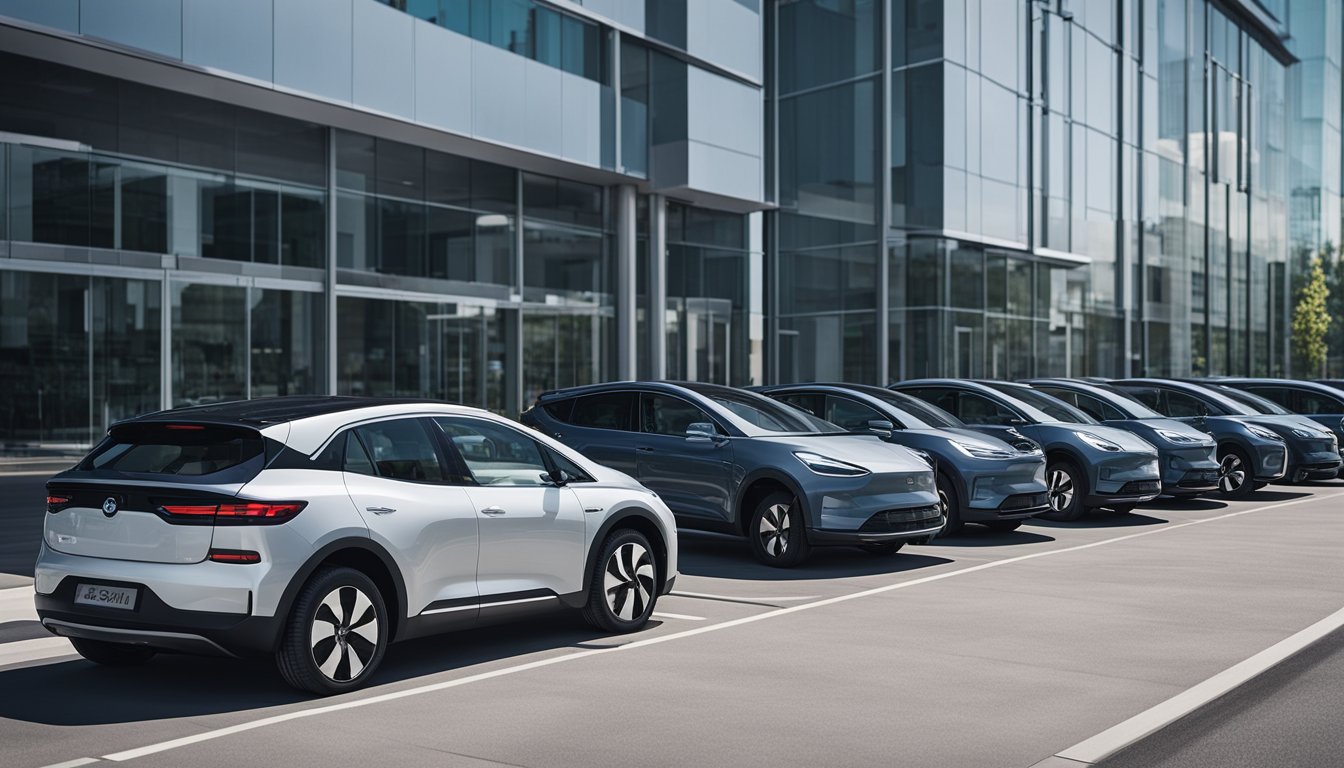Late updated: 05 May 2025 14:05
Written by: Amber Collins
The Role Of Electric Vehicles In UK Business Sustainability: A Path Forward
In today's rapidly evolving business landscape, the introduction of electric vehicles (EVs) is proving to be a turning point for UK businesses committed to sustainability. Electric vehicles offer companies significant opportunities to reduce carbon emissions while capitalising on cost savings through lower running expenses and favourable tax incentives. By integrating these vehicles into their operations, businesses can contribute to the nation’s climate goals and enhance their own green credentials.

The transition to EVs isn't just about reducing emissions; it's about defining the future of transportation and business strategy. As more companies embrace this change, they are also facing challenges such as the need for adequate charging infrastructure and managing upfront costs. These hurdles, however, provide a chance for innovation and growth within the industry.
Engagement in sustainable practices, such as adopting electric vehicles, sets a precedent for corporate responsibility and innovation. It signals a commitment not only to environmental stewardship but also to leading by example in the shift towards a sustainable future.
Key Takeaways
- Electric vehicles are vital for reducing emissions and improving UK business sustainability.
- Adoption of EVs supports climate goals and offers potential cost savings.
- Challenges include infrastructure needs and initial costs but also drive innovation.
Electric Vehicles as a Catalyst for UK Business Sustainability
As the UK moves towards achieving net zero emissions, electric vehicles (EVs) present an essential pathway for businesses. They offer opportunities to transition fleets, reduce carbon footprints, and partake in sustainable initiatives.
Transitioning from Petrol and Diesel Cars
The shift from petrol and diesel cars to electric cars is more than just a change in transport. It's a crucial step in a business's sustainability journey. Embracing EVs mitigates the harmful effects associated with combustion engines, such as air pollution and carbon dioxide emissions.
Fleets converting to EVs can benefit from lower operational costs. Businesses encounter reduced fuel expenses and minimal maintenance costs. Tax incentives, such as those for zero-emission vehicles, further motivate businesses to electrify their fleets.
Reducing Corporate Carbon Footprint
EVs represent a key strategy in lowering corporate carbon emissions. Transitioning company fleets from traditional vehicles to electric contributes significantly to reducing the overall carbon impact of business operations.
Charging solutions, integrated within workplace infrastructure, boost efficiency and convenience. Companies investing in widespread EV adoption showcase their commitment to sustainability. By lowering emissions, businesses enhance their reputation and meet environmental legislation.
The Role of Company Cars in Decarbonising Fleets
Company cars are central to the decarbonisation agenda. Deploying electric company cars within fleets enables a shift towards sustainable transport options. EVs encapsulate the transformative approach necessary for achieving cleaner air in urban environments.
Deploying EVs in company fleets exemplifies forward-thinking and eco-friendly strategies. Businesses capitalising on this opportunity not only support environmental goals but also lead by example in promoting the sustainable car initiative.
Achieving Net Zero Emissions through EV Adoption
Electrifying fleets paves the path to net zero emissions. By investing in EVs, businesses play a pivotal role in the country's climate targets. EVs minimise reliance on fossil fuels, helping companies align with national policies for emission reduction.
Strategic planning and investment in charging infrastructure are key for realising these goals. Through this, we set the foundation for a sustainable future, showcasing responsible and environmentally conscious business leadership.
Key Factors Driving EV Adoption and Impact

Electric vehicles (EVs) play a vital role in advancing UK business sustainability. Their adoption is driven by several key factors, impacting not only technological growth but also environmental and social governance.
Charging Infrastructure and Renewable Energy Solutions
A robust charging infrastructure is essential for the widespread adoption of EVs. Public charging stations, supported by energy providers, cater to both urban and rural areas, thus enhancing accessibility.
The integration of renewable energy sources, such as solar and wind, into the charging network reduces CO2 emissions and enhances environmental impact. By advancing these solutions, we contribute to a sustainable future. The deployment of hybrid cars and zero tailpipe emissions vehicles also minimises pollution, aligning with the UK's climate change goals.
Incentives, Salary Sacrifice, and BiK Rate Benefits
Government incentives are a powerful catalyst for EV adoption. Initiatives like salary sacrifice schemes and reduced Benefit-in-Kind (BiK) rates make electric vehicles more financially appealing for businesses and employees.
These incentives lower the cost of ownership and promote growth in EV usage. By opting for these financial strategies, companies can reduce their tax liabilities and invest in greener technologies. Consequently, businesses benefit from cost savings while actively participating in eco-friendly practices.
Environmental, Social and Governance Considerations
Environmental, Social and Governance (ESG) factors are central to EV adoption. Reducing tailpipe emissions is not only better for the environment but also addresses the social aspect of cleaner cities and healthier communities.
Companies are encouraged to communicate these benefits to employees, emphasising their commitment to sustainable practices. This communication enhances corporate reputation and aligns business operations with societal expectations, promoting long-term value creation.
Innovation and Future Trends in Sustainable Mobility
Innovation in EV technology and sustainable mobility offers exciting prospects for businesses. Companies like MINI are pioneering advancements in vehicle efficiency and automation. Emerging trends include advances in battery technology, expanding the range and lifespan of EVs.
Additionally, developments in smart charging systems enable more efficient energy use. These innovations ensure that businesses stay competitive while adopting sustainable strategies. As we look to the future, embracing these changes facilitates a transition towards a more resilient and environmentally-conscious transport ecosystem.
Frequently Asked Questions

Electric vehicles (EVs) are integral to achieving sustainability in UK businesses. There are various incentives and tax reliefs available, along with government grants, to support businesses transitioning to electric fleets. It's vital for companies to develop comprehensive charging policies and explore strategies to enhance sustainability through EVs.
What incentives are available to UK businesses purchasing electric vehicles?
There are a range of incentives available to businesses in the UK when purchasing electric vehicles. These include grants from the government that reduce the initial purchase cost. Additionally, companies may benefit from reduced vehicle tax rates and exemption from congestion charges.
How can UK businesses benefit from tax reliefs when integrating electric vehicles?
When integrating electric vehicles into their operations, UK businesses can benefit from tax reliefs such as the Plug-in Car Grant. This provides a discount off the purchase price of eligible EVs. Furthermore, firms can claim capital allowances, allowing them to deduct part of the cost from their profits before tax.
What are the available government grants for UK businesses adopting electric vehicles, and how can they be accessed?
UK businesses have access to grants like the Plug-in Car and Van Grants, which offer financial support. These grants reduce the purchase costs of qualifying vehicles. To access these grants, businesses should work with dealerships that apply for the grant on their behalf at the point of purchase.
How should UK companies implement EV charging policies for their fleets?
Companies need to develop robust charging policies to support their electric fleets. This involves installing charging points at key locations, providing employees with clear guidelines for charging expenses, and considering integration with renewable energy sources. Effective planning ensures availability and optimises the use of resources.
What is the list of zero-emission vehicles eligible for government incentives in the UK?
The UK government maintains an updated list of zero-emission vehicles eligible for various incentives. This list includes full battery electric vehicles and certain plug-in hybrids. Eligibility criteria can vary, so consulting the latest government resources or official websites is essential for accurate information.
What strategies can UK businesses employ to enhance sustainability through the use of electric vehicles?
UK businesses can enhance sustainability by adopting electric vehicles through several strategies. Investing in renewable energy sources for charging infrastructure is one approach. Additionally, training staff on eco-friendly driving practices and optimising route planning can further reduce environmental impact and operational costs.
